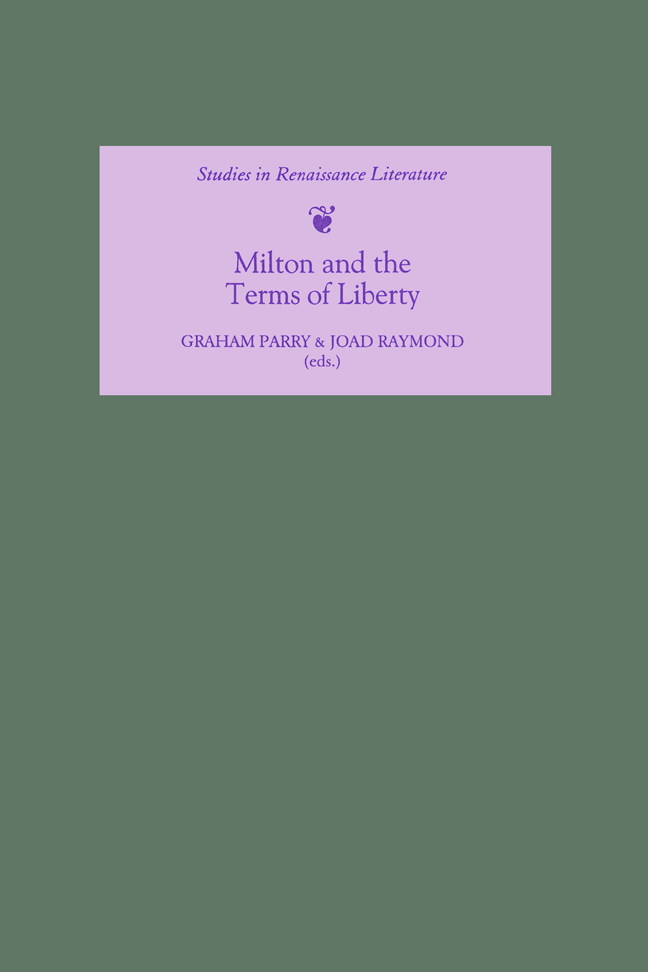Book contents
- Frontmatter
- Contents
- Contributors
- Acknowledgements
- Introduction
- 1 John Milton and the Politics of Slavery
- 2 Milton before ‘Lycidas'
- 3 Prosody and Liberty in Milton and Marvell
- 4 'In These Western Parts of the Empire': Milton and Roman Law
- 5 The King is a Thing
- 6 'in time of Warre … our Language is all corrupt with military Tearms': The Politics of Martial Metaphors in Post-regicide England
- 7 Alexander More Reads Milton: Self-representation and Anxiety in Milton's Defences
- 8 Stylometry and the Provenance of De doctrina christiana
- 9 The Figure and the Ground: Samson as a Hero of London Nonconformity, 1662-1667
- 10 The Publication of the King's Privacy: Paradise Regained and Of True Religion in Restoration England
- 11 'To try, and teach the erring Soul': Milton's Last Seven Years
- 12 Pandemonic Panoramas: Surveying Milton's ‘vain empires’ in the Long Eighteenth Century
- Index
- Studies in Renaissance Literature
9 - The Figure and the Ground: Samson as a Hero of London Nonconformity, 1662-1667
Published online by Cambridge University Press: 15 February 2024
- Frontmatter
- Contents
- Contributors
- Acknowledgements
- Introduction
- 1 John Milton and the Politics of Slavery
- 2 Milton before ‘Lycidas'
- 3 Prosody and Liberty in Milton and Marvell
- 4 'In These Western Parts of the Empire': Milton and Roman Law
- 5 The King is a Thing
- 6 'in time of Warre … our Language is all corrupt with military Tearms': The Politics of Martial Metaphors in Post-regicide England
- 7 Alexander More Reads Milton: Self-representation and Anxiety in Milton's Defences
- 8 Stylometry and the Provenance of De doctrina christiana
- 9 The Figure and the Ground: Samson as a Hero of London Nonconformity, 1662-1667
- 10 The Publication of the King's Privacy: Paradise Regained and Of True Religion in Restoration England
- 11 'To try, and teach the erring Soul': Milton's Last Seven Years
- 12 Pandemonic Panoramas: Surveying Milton's ‘vain empires’ in the Long Eighteenth Century
- Index
- Studies in Renaissance Literature
Summary
I have always numbered myself among those readers of Samson Agonistes who consider that ‘the Restoration decade is the work's natural home’ and that ‘the drama makes an intensified kind of sense … in the later context'. Milton's imagery, especially, seems topically suggestive. I have repeatedly re- read the late simile of ‘that self-begotten bird/ …/ That no second knows nor third,/ And lay erewhile a holocaust’ (lines 1699-1702) and imagined that Milton was somehow in dialogue with Dryden. The dedication to Annus Mirabilis (1667) addresses ‘The most Renowned and late Flourishing City of London, In Its Representatives, The Lord Mayor and Court of Aldermen, the Sherifs and Common Council', and affirms: ‘To you … this Year of Wonders is justly dedicated, because you have made it so. You who are to stand a wonder to all Years and Ages, and who have built your selves an immortal Monument on your own ruines. You are now a Phoenix in her ashes, and as far as Humanity can approach, a great Emblem of the suffering Deity.'
Milton scholars are presently well positioned, in both theory and practice, to explore the possible Restoration topicality in Samson Agonistes. J. G. A. Pocock's work on the period dynamics and permutations of key political terms has provided fresh motivation for the study of vocabulary, while Quentin Skinner's essays on meaning and understanding, on the interpreta- tion of texts, and on language and social change, have been no less influential in stressing the importance (and the recoverability) of the elements of conventionality within a text. Further incentive has come from Pocock's proposals that we think of texts as ‘sophisticated verbal performances that are certainly events'and of historical work on them as ‘reconstitut[ing] a context, or a series of contexts in which the text as event may be rendered intelligible'. Most recently and most specifically, Blair Worden has assembled a textual context for Samson Agonistes out of prose writings of the 1660s by three prominent English republicans: Edmund Ludlow, Algernon Sidney and Sir Henry Vane.
In Worden's analysis, Ludlow and Sidney manifest many points of them- atic convergence with Milton – in effect, their sentiments and outlook tally broadly.
- Type
- Chapter
- Information
- Milton and the Terms of Liberty , pp. 137 - 162Publisher: Boydell & BrewerPrint publication year: 2002



